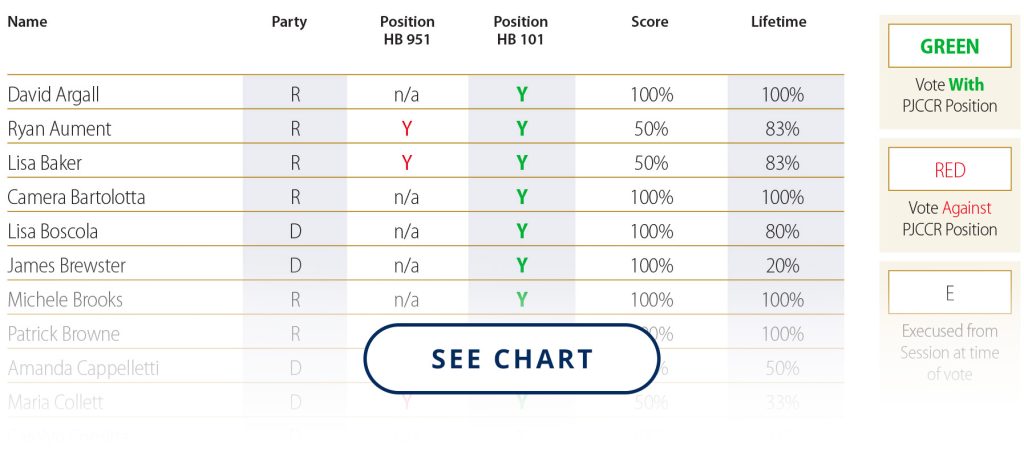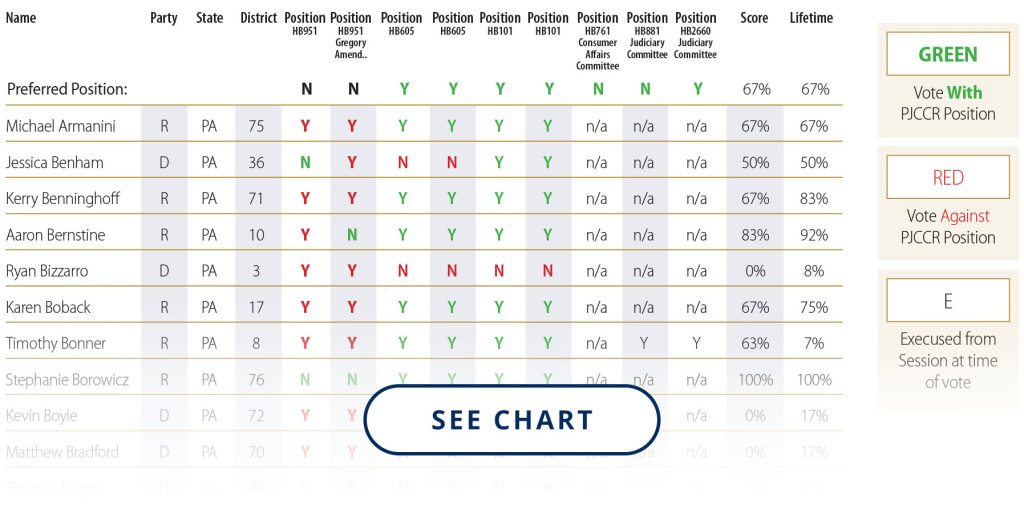Pennsylvania’s Litigation Climate Impacts Everyone!
Pennsylvanians can significantly impact the outcome of the Commonwealth’s legislative and executive elections. On the ballot this year will be candidates for governor, 203 members of the state House, and half of the Senate (25 members). These positions carry a tremendous responsibility. Legislators are charged with setting public policy through enacting laws that impact every Pennsylvanian, particularly in the areas of liability and civil justice. Governors, meanwhile, can veto or sign bills into law and exert their influence via the regulatory process and by executive order.
Elections have consequences. For too long, Pennsylvania’s elected officials have enacted laws and pursued policies that have had a detrimental effect on the Commonwealth’s civil justice climate. The state’s overly litigious legal environment increases the burden on taxpayers and serves as a red flag to businesses that are looking to invest. The time to chart a new direction starts now. In this election cycle, it is critical that voters support candidates that are in favor of right-sizing Pennsylvania’s legal climate. PCCJR’s Voter Guide was developed to be a helpful resource for voters by giving an overview of the negative impact the Commonwealth’s civil justice system has on taxpayers and job creators, as well as the philosophies of the candidates on the ballot.
Legislative Elections Directly Impact Your Chance of Getting Sued!

Pennsylvania needs a governor and a legislature that will enact much-needed legislation to reform our civil justice system.
The Commonwealth ranks 39th in the nation for its litigation climate according to a survey by the U.S. Chamber Institute for Legal Reform (ILR). Many people don’t realize how much the litigation climate impacts our everyday lives. The jobs we count on, the healthcare we receive, and the overall well-being of our communities are all impacted by the laws governing civil litigation. When state leaders cozy up to plaintiffs’ attorneys, there are serious costs for everyone. It is important that our legislators and governor enact laws that establish a reasonable litigation climate and reverse the impact of judicial decisions that tilt the scales of justice unfairly in favor of plaintiffs’ attorneys.
Frivolous Lawsuits Have Serious Costs
According to another study by ILR, the total cost of the “tort” or personal injury side of the court system in the United States is $429 billion, representing 2.3% of the gross national product. Pennsylvania’s civil tort system equates to $18.374 billion or 2.5% of the state’s gross domestic product. A full 44% of the cost of PA’s civil justice system is attributable to lawyers’ fees and other expenses, leaving injured people to recover only the remaining 56%. In fact, the cost of Pennsylvania’s civil court system amounts to $3,721.00 per household! That places our state just below the top 10 for the highest tort costs per household in the nation. The cost of the civil court system is essentially an extra “tort tax” paid by every household in the state to prop up the inefficient delivery of civil justice. Added expenses via litigation are the last things Pennsylvanians need during this period of high inflation!
Jobs are at Stake
As sobering as those figures are, the American Tort Reform Association (ATRA) placed Philadelphia and the Pennsylvania Supreme Court near the top of its rankings of Judicial Hellholes for 2021! The legal climate is a key economic factor in business location and expansion decisions. Being considered a “Judicial Hellhole” gives job creators another reason to invest elsewhere, resulting in fewer jobs for Pennsylvanians.
Venue Shopping Threatens Access to Healthcare
Recently, the Pennsylvania Supreme Court announced it was rescinding the state’s medical malpractice venue rule. The Pennsylvania Coalition for Civil Justice Reform has long advocated against a change to the rule, citing independent studies that a return to venue shopping will lead to higher health care costs across the Commonwealth.
Venue determines where a case can be filed in the Commonwealth. When plaintiffs’ attorneys venue shop, they seek to file medical liability lawsuits in Philadelphia and other high verdict jurisdictions in search of jackpot verdicts – even though the location of the court has no connection to the case. Prior to a 2003 rule prohibiting venue shopping in medical liability cases, Pennsylvania was in the grip of a medical liability crisis. Despite the success of the rule, over the past several years, plaintiffs’ attorneys have launched a full-scale campaign to have it reversed in order to go back to the days of venue shopping in search of the bigger jackpot verdicts. While this rule change is a huge win for the trial bar, it will have dire impacts for residents throughout the state.
As a result, medical liability premiums will soar, access to physicians and specialty services will decline, and the health care crisis will return. Pennsylvania is already facing a clinician shortage – we can’t afford to drive more health care professionals out of state!
Pandemic Heroes Need Protection
The global COVID-19 pandemic brings the threat of lawsuits into sharp focus. Plaintiffs’ attorneys seek to blame businesses for the exposure and spread of COVID-19. While health care workers care for the sick and businesses seek to meet the need for personal protective equipment and other essential products and services, opportunistic lawyers are looking to make a quick buck off the suffering. Doctors, hospitals, long-term care facilities, and others in the health care industry, need safe harbor liability protection from lawsuits resulting from the delivery of care during this unprecedented time. Additionally, those who have retooled their businesses to meet the demand for personal protection equipment deserve to be protected from lawsuits in support of their efforts. Employers must be protected from speculative claims of COVID-19 exposure in their places of business if Pennsylvania’s economy is to fully recover.
Court Decisions Inject Unfairness. Governor and Legislature Must Respond
Recent court decisions have eroded Pennsylvania’s Fair Share Act. Signed into law in 2011, the Fair Share Act ensures that a defendant only pays for the percentage of a verdict in relation to their fault. No longer can a minimally liable defendant be required to pay the entire verdict. Several recent court decisions have eroded the protections afforded under the Fair Share Act to those who are sued. The next Governor and legislature must act to restore the original legislative intent of the Fair Share Act.
What Should We Look for in Gubernatorial and Legislative Candidates?
The last eight years have been challenging for those concerned about lawsuit abuse and fairness in our civil court system. Governor Tom Wolf vetoed several bills which would have provided needed protections for those subjected to lawsuits. Most notably, he vetoed COVID-19 related liability protections contained in HB 1737. Pennsylvania’s next governor and general assembly must recognize the need to reform our litigation system and end the crushing burden on businesses, health care, and families caused by frivolous lawsuits.
The Pennsylvania Coalition for Civil Justice Reform (PCCJR) considers several factors when reviewing the positions and qualifications of candidates. Above all, our members want leaders who will enact laws that are fair, reasonable, and balanced. Job creators and Pennsylvania’s economy are damaged by policies that expand concepts of liability in ways that are unwarranted and lead to unexpected consequences. Laws that recognize the need for consistency in our courts, predictability in legal outcomes, and an understanding that a certain amount of risk is inherent in any human activity will set the right climate for job growth, opportunity, and preservation of medical care. Gubernatorial and legislative candidates should support laws that encourage restraint to prevent run-a-way liability costs and bring about the stability needed to protect job opportunities and access to healthcare. We believe candidates who value common sense and personal responsibility will make good policymakers.
Candidate Questionnaire Responses
Open Seats
The PCCJR sent candidate questionnaires to all candidates running in open House and Senate seats across Pennsylvania. Those who responded and the links to their responses are found below.
| House | District 54 | Alan Anderson |
| House | District 178 | Ilya Breyman |
| Senate | District 24 | Jill Dennin |
| House | District 47 | Joe D’Orsie |
| Senate | District 14 | Nick Miller |
| House | District 51 | Richard Ringer |
| House | District 113 | Aaron Sepkowski |
PA Senate Incumbents
HB 951 – (Judiciary Committee)
Description: Statutory effort to create temporary window to revive claims barred by statute of limitations. Allowing retroactive claims otherwise barred by the statute of limitations is unconstitutional and could lead to other efforts to negate statutes of limitations.
The pro civil justice reform vote is NO.
HB 101
Provides limited protection from liability for Agri-Tourism activities.
The pro civil justice reform vote is YES.
2021-2022 PA Senate Incumbents — How They Voted

PA House Incumbents
The PCCJR identified these key votes of the 2021-2022 legislative session to be of crucial importance to our members and the advancement of civil justice reform in Pennsylvania. This guide and matrix tracks how the members voted.
HB 951 – Final Passage
Description: Statutory effort to create temporary window to revive claims barred by statute of limitations. Allowing retroactive claims otherwise barred by the statute of limitations is unconstitutional and could lead to other efforts to negate statutes of limitations.
The pro civil justice reform vote was NO.
HB 951 – Gregory Amendment
Description: inserted unconstitutional revival of claims barred by statute of limitations language into HB 951.
The pro civil justice reform vote as NO.
HB 605 – Ecker Amendment
Description: Inserted into the bill covid liability protections for health care, businesses, personal protection equipment manufacturers, colleges, schools, day care and municipalities.
The pro civil justice reform vote is YES.
HB 605 – Final Passage
Description: Final passage of covid liability protections for health care, businesses, personal protection equipment manufacturers, colleges, schools, day care and municipalities.
The pro civil justice reform vote is YES.
HB 761 – Consumer Affairs Committee Vote
Description: Increases the amount of statutory damages for a violation of the Unfair Trade Practices Act from $100 to $500.
The pro civil justice reform vote was NO.
HB 881 – Judiciary Committee
Description: Emergency constitutional amendment to open window to file claims otherwise barred by statute of limitations. The emergency constitutional amendment procedure has only been used for natural disasters. This legislation does not fall within the accepted definition of emergency.
The pro civil justice reform vote was NO.
HB 2660 – Judiciary Committee
Description: Constitutional amendment allowing legislature to set policy on venue in civil cases.
The pro civil justice reform vote was YES.
HB101– Agritourism
Description: Provides limited protection from liability for Agri-Tourism activities.
The pro civil justice reform vote was YES.
2021-2022 PA House Incumbents — How They Voted




